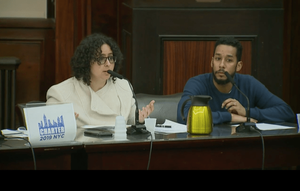Comprehensive Planning for a more just, equitable NYC

Testimony before the 2019 Charter Revision Commission
Good evening, and thank you for the opportunity to testify. My name is Elena Conte, and I am the [Deputy Director] at the Pratt Center for Community Development, which has been working closely with the Thriving Communities Coalition.
I have fifteen years of experience working for and with community-based organizations in low income communities of color, and my organization has been dedicated to supporting the planning and implementation efforts of these communities for close to sixty years. That description doesn’t do justice to what this work is, however—a community-based plan is both process and product that elicits and then codifies a collective set of values into a practical roadmap to manifest them.
Pratt Center believes that a comprehensive planning framework has the potential to mirror this process at a citywide level, and my mission tonight is to describe how such an effort, by actively engaging local communities throughout, represents our only real promise to achieve citywide goals of equity and justice.
As described in our longer written comments, which will be subsequently submitted, a comprehensive planning framework respects the expertise of local communities to determine and articulate their own needs and also charges and trusts them with contributing to the betterment of the city as a whole.
This is a radical departure from our current ad hoc system, which is dominated by as-of-right land use actions and review. It is ineffective, polarizing, and disempowering to most communities, even those whose wealth and privilege afford them disproportionately more power than low income communities of color. It is not, however, a radical departure from how planning is done in other major U.S. cities.
Whether your perspective is that “not enough projects get ‘through’” or that “terrible projects are rammed down communities’ throats”—a comprehensive planning framework has something to offer. Much of the contention in local land use battles can be traced to:
1. longstanding unmet needs,
2. the lack of genuine engagement in the process, where instead of being asked to co-create plans, communities are pushed into reactionary positions, and in some cases,
3. exclusionary tendencies.
Comprehensive planning addresses each of these. It provides for:
1. Acknowledgement and assessment of the impact of previous planning practices, including racist disinvestment and redlining, through
- A statement of principles and values to guide the framework
- A comprehensive, data-driven needs assessment of housing, transportation, health, education, jobs, and other needs at the local level. This provides greater information about neighborhoods and their relationship to others across a slate of critical measures—including residential displacement risk, and economic and educational opportunity.
- An emphasis on investing in areas of greatest need, and budgetary alignment of commitments for capital project and programmatic (expense) expenditures.
2. The opportunity to participate in and co-create the citywide, equity-based collective goals that guide the framework
- This would be instead of goals that are solely determined by the Mayor, announced in various (and sometimes conflicting) policy documents by different agencies, with different or non-existent reporting requirements
3. The responsibility and opportunity to engage in neighborhood-based planning that contributes to the well-being of the whole city and the reduction of inequality
- The current system not only allows but encourages neighborhoods to only consider the local impact of a proposal, giving them a free pass from grappling with the hard questions of how to balance our interconnectedness and interdependence—questions they are fully capable of tackling when properly supported to articulate a proactive vision.
- Neighborhood-level planning that has official standing will increase participation, generate new ideas, and organize the community around a vision.
In sum, a comprehensive planning framework is the way to repair our broken, piecemeal system by integrating and aligning planning, policy-making, and the budget in an intentional way to achieve our equity goals. A plan, just like the budget that should be attached to it, is an expression of our values. Failing to create a comprehensive framework for our city has fostered our dramatic failure to address inequality. We can and must do better. We and our partners have worked extensively on concrete proposals for how to achieve these goals and we look forward to working closely with you to craft a proposal for the ballot.